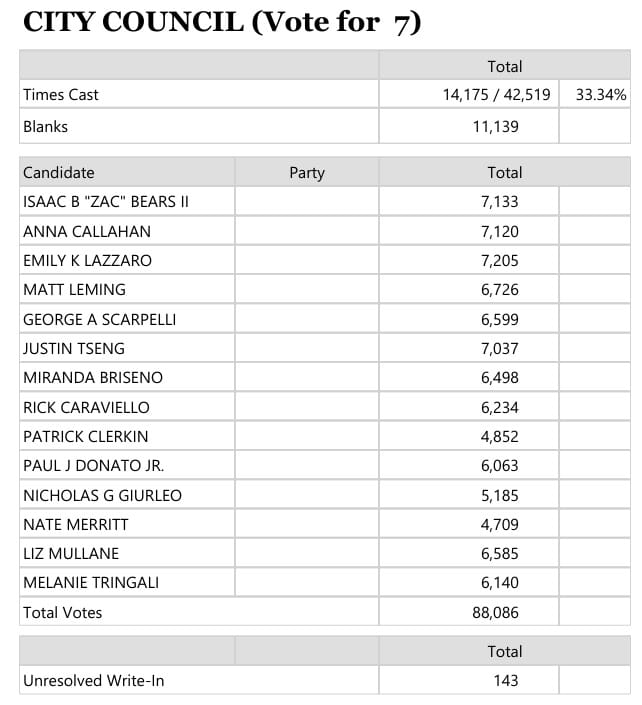Meet City Council Candidate Page Buldini

How many years have you lived in Medford?
I’ve lived in Medford for over 15 years with my husband, Jeff, who grew up here, and our daughter, Kate, who is a second grader at Missituk Elementary. She’s growing up in the same schools and community her dad once did, and over the years I’ve become deeply connected to Medford through my family, my business, and the work I do in our community.
Please describe your professional background and education.
I graduated from Emmanuel College in 2006 with a B.A. in psychology, concentrating in health and counseling, and minoring in philosophy. I played four years of collegiate soccer and was a team captain for two of those years, an experience that taught me how to lead, communicate, and put the team first. I carry those lessons into my work today.
I’ve worked in the salon and skincare industry for over 17 years, and for the past seven years I have solo owned and operated Page Aesthetics Skincare in Medford’s Hillside neighborhood. As a small business owner, I’ve had to adapt constantly — pivoting during the pandemic, finding new ways to generate revenue, and keeping my doors open when many in my industry closed.
My business has grown through the trust of referrals and word of mouth, and I’m honored every time a new client comes in because someone recommended my work. I’ve also seen the power of communication through social media, both in building my own business and in managing the Medford Chamber of Commerce’s platforms, which I’ve significantly grown to promote and support local small businesses. Those skills of listening, adapting, and connecting are the same ones I’ll bring to City Council.
What, if any, city positions (appointed or elected) have you held, and for how long?
This is my first run for an elected city position. I have served on the Medford Chamber of Commerce Board of Directors for over a year and a half and also on the Communications Committee, where I’ve built strong relationships with City Hall, local businesses, and community organizations.
What volunteer roles have you participated in that you feel have made a difference in Medford?
I’m proud to have connected Run Medford directly to all eight PTOs through the Medford citywide PTO alliance, making this year’s race a true community event that benefits every public school. I’ve also volunteered as a coach for Medford Youth Soccer and the Saints Basketball League. Over the years, I’ve been excited to donate to and sponsor through my business all of Medford’s PTOs, along with a wide range of youth sports organizations, Medford High School teams, and community programs across the city. Supporting our kids and schools, including my own daughter’s, is one of my top priorities.
Why should residents vote for you?
I understand the challenges Medford families, small businesses, and neighborhoods face every day because I live them too. As a small business owner, I know what it takes to adapt, problem-solve, and keep going in tough times. As a parent, I know how important it is that our schools and city services meet families’ needs.
I’ve built connections across the city through the Chamber of Commerce, PTOs, Run Medford, and youth sports, and I’ve proven I can turn those connections into action. Whether it’s linking Run Medford with every PTO, helping businesses find support through the chamber, or bringing community voices into zoning conversations, I’ve shown that I don’t just talk about problems — I do the work to solve them.
Through my business, I’ve also learned how to be a true active listener. Every day I hold space for people, whether their perspectives are similar to mine or different, and I make sure they feel seen, respected, and valued. That is what Medford needs in its leadership. I’m running unaffiliated because I want to represent all of Medford, not one group or one slate. I don’t quit. I adapt, I listen, and I follow through.
I’m also proud to have earned the endorsement of the Massachusetts Women’s Political Caucus. That endorsement reflects the hard work I put in, and it matters deeply to me because, like MWPC, I care about equity, inclusion, and increasing representation in politics. It means I’ve been tested, I’ve shown up, and I’ve proven I’m ready to lead.
What do you believe are the top 3 issues currently facing the city of Medford? How do you specifically plan to address those issues?
1. Making Medford open for business; As a small business owner, I know firsthand how challenging it can be to navigate City Hall. Medford has so much potential, but we need clearer processes and better communication to make it easier for businesses to open, grow, and thrive. That’s why I support creating a developer engagement program: a clear, step-by-step process that brings developers to the table early, shows them exactly where in Medford we want investment, lays out what kinds of projects make sense, and defines how their developments should contribute to our infrastructure, schools, and city services.
At the same time, we need to streamline permitting and approvals at City Hall so small businesses and local entrepreneurs aren’t left waiting or feeling shut out. By combining stronger engagement with developers and clearer support for local businesses, we can fill vacant storefronts, attract thoughtful investment, and grow our tax base. When Medford is truly open for business, we bring in the revenue we need to support schools, services, and infrastructure without putting more of the burden on residents.
2. Finding new revenue streams; Medford can’t keep relying on property taxes alone. We need to expand and diversify how we bring in money so we can strengthen our city without putting more of the burden on residents. That means making sure developers contribute their fair share, activating vacant storefronts across our squares, and going after state and federal grants that can bring outside dollars into Medford.
Medford also has the potential to become a true food and cultural destination. With restaurants like Goldilox, Deep Cuts, the Ford Tavern, and Oasis, we already have a strong foundation. Add in cultural anchors like the Chevalier Theatre and our rich history — from the Mystic River to Amelia Earhart — and the potential is there. If we make it easier for people to come here, stay here, and spend here, Medford can grow into a regional destination that brings new dollars into our schools, roads, and services.
Tufts University should also be a stronger partner in this effort. I’ve been engaging with Tufts community relations, where I have strong ties, to explore how we can expand contributions beyond the PILOT program into community grants, school funding, and volunteerism. Tufts has incredible resources, and Medford should benefit more fully from them.
3. Bringing Medford together; The biggest issue facing our city is that we are divided and too often assume the worst of each other. And when we cannot participate in collaborative discussions, people get left out. Too many residents feel like their voices don’t matter or that decisions are being made without them. You can see it in debates over zoning and in the disconnect many parents feel between schools and City Hall.
That’s also why I strongly support Medford’s charter review. Voting “yes” on the charter will bring ward representation, giving neighborhoods and business districts a stronger voice. It’s one of the most important steps we can take to create a more inclusive, connected city where all voices are represented.
Medford doesn’t need more sides, slates, or gridlock. Medford needs leadership that includes everyone, listens to all, and moves us forward together.
This is not lip service. It is who I am, and it’s why I am the right person for this job. I served as a captain on the soccer field, I’ve led kids in youth sports, and I’ve led as a small business owner who built something from nothing and kept it alive through the hardest times. Leadership means never putting yourself first, but always putting the team — or in this case, the city — first.
Every single day, I am listening, connecting, and amplifying voices that deserve to be heard. I make space for people who feel left out, and I bring people together who don’t always agree. That is leadership, and that is exactly what I will bring to the City Council.
I don’t have a broad political agenda, and I’m not working with a group or a slate. My agenda is simple: to listen, to bring people together, and to get things done for Medford. I won’t please everyone, but I commit to listen with respect to make informed decisions for the voters who elected me.
Transparency and communication are vital in representative government. What steps will you or have you taken to keep your constituents informed about local decisions and to explain your voting rationale?
I believe residents deserve straightforward answers. I already use social media and community meetings to share updates quickly, and I’ll continue to do that on the City Council. When I cast a vote, I’ll explain in plain language what I supported, why, and what it means for Medford families. This isn’t new for me — it’s what I do in my business, for the Chamber of Commerce, and every single day: communicate clearly, listen actively, and keep people informed.
What specific methods will you use to gather and represent your constituents’ perspectives on issues that come before the City Council? I’ll meet people where they are — and I’ve already started. I’m excited to have met so many new faces at senior centers, coffee shops, community groups, and the library. I hear from people walking down Boston Avenue where my salon is and on the sidelines of youth sports. I’ll keep showing up at PTO events, local gatherings, and neighborhood activities, because that’s where real conversations happen.
I’m also part of Medford’s small business community. We support one another, and when I frequent other small businesses, I connect with the owners and their customers. Those conversations are invaluable because they reflect the everyday experiences of Medford residents.
I’ll also use podcasts, YouTube channels, and social media so residents of all ages can share their perspectives and stay informed. My website, email, and social media are always open — I want to hear what you think and how you feel. Your experiences will guide the decisions I make as your representative.
The past two years, the City Council has been updating the zoning across the city. Many residents feel the process has been too quick and has covered too much at once. What are your thoughts on that? If elected, how would you approach zoning?
Zoning is often talked about in codes and maps, but at the end of the day it’s about something much more personal: home. And whether you rent, own, or manage a property, home is emotional — it’s stability, opportunity, and family.
That’s why at the end of May, I asked to slow the zoning process down — not to stop it, but to make sure we got it right. During that time, I did my homework. I dug in to educate myself, and I reached out directly to Medford fire, police, and our educators. What I learned was that they hadn’t been asked about the impacts. Their voices — along with residents’ voices — are essential, because zoning shapes the everyday impact on our schools, city services, and public safety.
As part of that work, I also called for business districts to be considered separately from residential areas. When I looked closely at the maps, especially around the Tufts zone and the Boston Avenue corridor, I saw zoning proposals that extended well beyond the business districts themselves. That’s something we need to take a careful look at. I believe business districts should come first, and they need to be planned for mixed use — with thriving storefronts on the ground floor and housing opportunities above. That’s how zoning reform can activate vacant spaces, support our small businesses, and bring in revenue for the city while also adding housing in a thoughtful, balanced way.
Right now, there’s also confusion about what’s already been decided. For example, it isn’t clear whether the proposals for Salem Street and Mystic Avenue have been officially approved or are still being processed. Those are the kinds of clear answers residents and business owners deserve. And that ties into a bigger issue — the process itself is hard to follow. Between the Community Development Board, the Planning and Permitting Committee, and the City Council, it isn’t always clear where things stand. Supporting zoning reform also means supporting a clearer, more transparent timeline so residents and business owners know how to follow along and be part of the conversation.
To me, zoning reform is about giving people options — options that families in Medford have relied on for generations. Two- and three-family homes are a great example. They’re not new to Medford — they’ve always been part of our city. My own family knows this first-hand. My husband grew up in a two-family here, and that home gave his family stability for decades. Now our daughter is growing up in the same house, connected across generations because of the opportunities a two-family makes possible.
That’s why I say zoning reform isn’t about changing Medford’s character — it’s about protecting the choices that have always worked for families here. Alongside two-families, other tools like ADUs — accessory dwelling units — and historic conversions give people flexibility to adapt their property, preserve older buildings, and keep Medford livable for the long term.
The way I see it, zoning reform works best when we follow a few simple principles:
- Step by step, not all at once. We need an incremental approach — starting with our business districts, then carefully looking at residential areas.
- Local control. Zoning decisions should be made in Medford, by Medford, in a way that reflects the needs of our residents, businesses, and city services.
- Practical, real-life reasons. For homeowners and building owners, that means options to stay in their homes longer, keep extended families together, or create rental income. For renters, it means more stable, affordable housing choices so they can stay in Medford too.
- Economic impact. Zoning has to strengthen Medford — by supporting small businesses, bringing in more revenue, and making sure city services can keep up with growth.
Finally, zoning reform should never be a one-and-done decision. If something isn’t working, or if the city’s needs change, we should be able to revisit and adjust. Reform has to be a living process that evolves with the community.
At the end of the day, my goal is simple: to support zoning reform that gives homeowners, building owners, and renters the tools and opportunities they need, while making sure Medford grows in a way that’s balanced, sustainable, and true to our community.
There have been City Council meetings that have gone past midnight. Do you really think these marathon meetings are serving the public? Should there be a time cap on meetings for everyone’s sake?
I don’t believe marathon meetings serve the public well. I’ve been present and even spoken close to 1 a.m., and while I was glad to be part of the discussion, it’s not the best way to encourage participation or thoughtful decision-making. Long nights make it harder for residents to engage and for councilors to do their best work.
As a city councilor, I would support steps that help meetings run more smoothly: clearer agendas, more work happening in committees before items reach the full council, and stronger time management. I also want to give credit to the two councilors who moved common victualler licenses earlier in the meeting. These licenses, required for most food service businesses, are usually quick to approve but vital for small business owners. Their initiative made a lot of sense, and I will push to make sure that change continues as a regular practice.
Those kinds of small but important steps can make a real difference. By streamlining items like these, we can respect residents’ time, support small businesses, and keep council meetings more accessible and productive for everyone.




